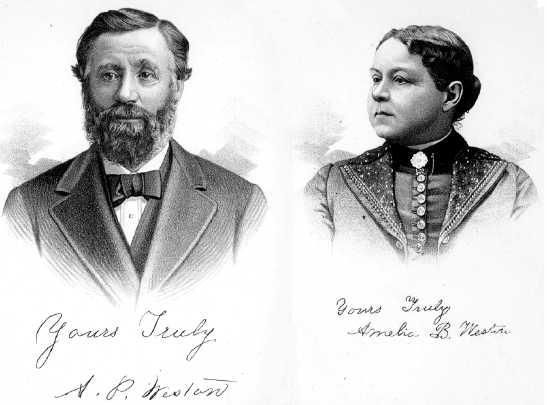dimensions, with a lean-to and an L
attached, making it very commodious; and another large
stock and grain barn, 24x64 feet, is also a fine
structure. These buildings are well constructed, and
after the most approved and conveniently arranged
plans. The house that Mr. Weston formerly occupied is
a pleasant frame dwelling, but the home to which he
will soon retire, in Nehawka, is a fine brick edifice
two stories in height, with basement, all the modern
appliances for comfort and convenience, and in its
exterior is an ornament to the village.
During his residence in Racine
County, Wis., Mr. Weston was married, Aug. 24, 1856,
to Miss Amelie Bent, who was born in the town of
Wendell, Franklin Co., Mass., March 24, 1839. She is a
daughter of William L. and Lucinda (Armstrong) Bent,
both of whom are deceased, the mother dying in Wendell
when her daughter of whom we write was only three
years old. She was a native of Massachusetts, and was
a daughter of Timothy Armstrong, likewise a native of
the old Bay State, and a farmer of Franklin County.
William Bent survived his first wife twelve years, and
was a second time wedded, Maria Woodbury becoming his
wife, and she survived him. Mr. Bent was a farmer, and
prosecuted his calling in Franklin County. He
subsequently removed to Wisconsin, and died in Racine
County. He was a son of Joel Bent, a native of Barry,
Mass. Mrs. Weston was reared by her father until his
death, and then her step-mother had charge of her
until she attained womanhood, and she continued to
live with her until her marriage, having accompanied
her parents to Racine County, Wis., when a child of
ten years. She is broad and liberal minded, a woman
whose large heart is full of womanly love and
neighborly kindness.
Mr. Weston has acquired his entire
fortune since leaving his native hills, and by the
exercise of habits of indefatigable industry, prudence
and economy. He inherited a full share of those fine
traits of character that mark the New England stock
and make them valuable citizens wherever they may
settle. He has not only been a hardworking man all his
life until recently, but his labors have been directed
by a mind of more than ordinary acuteness, and he has
always displayed an intelligent enterprise, and has
been quick to seize every opportunity or advantage
that would conduce to his material prosperity. He is a
Republican in his politics, and gives his party
earnest support, He has borne an honorable part in
public affairs is Assessor of the precinct, which
office he has twice held.
The portraits of Mr. and Mrs. Weston
adjoining, are a valuable acquisition to this
ALBUM, and will be regarded
with much pleasure by their many friends.

 ENJAMIN
F. LAUGHLIN. Both the personal and ancestral history
of the subject of this sketch, an enterprising
business man of Greenwood, is worthy of more than a
passing mention. A son of one of the earliest pioneers
of Washington County, Iowa, he was born there Aug. 25,
1841, and grew up amid its primitive scenes, at the
time when the Indians had not long been removed from
the western limits of the State. ENJAMIN
F. LAUGHLIN. Both the personal and ancestral history
of the subject of this sketch, an enterprising
business man of Greenwood, is worthy of more than a
passing mention. A son of one of the earliest pioneers
of Washington County, Iowa, he was born there Aug. 25,
1841, and grew up amid its primitive scenes, at the
time when the Indians had not long been removed from
the western limits of the State.
John Laughlin, the father of our
subject, was born in Randolph County, N. C., and
married Miss Mary Tucker, a native of the same State.
Both were the offspring of prominent old families, who
had emigrated to America during the Colonial days.
John Laughlin after his marriage migrated across the
Mississippi about 1835, and was one of the earliest
settlers of Henry County, Iowa. A man of great energy
and more than ordinary abilities, he by his own labors
furnished air incentive to the men around him, and
that part of Henry County in which he settled sensibly
outgrew its neighbors. He was held by his
fellow-citizens in high esteem, occupied the various
local offices, and accumulated a good property. He
personally assisted in removing the Indians from Henry
County to their reservation in Iowa, aird was foremost
in inaugurating the various enterprises which
gradually grow up within the precincts of a new
settlement. His death took place June 10, 1865, at the
old homestead, and that of the mother, December 7 of
the same year. The latter was six years younger than
her husband, and he was about fifty-two years old at
the time of his decease. To John and Mary Laughlin
there were born eleven children, namely:
|


